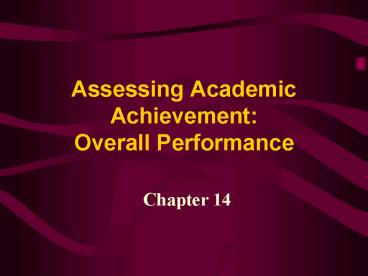Assessing Academic Achievement: Overall Performance - PowerPoint PPT Presentation
1 / 19
Title:
Assessing Academic Achievement: Overall Performance
Description:
... error analysis, games, interviews, observations, ... usually given at elementary level and ... coordination among subtest such as reading, math, and spelling ... – PowerPoint PPT presentation
Number of Views:30
Avg rating:3.0/5.0
Title: Assessing Academic Achievement: Overall Performance
1
Assessing Academic Achievement Overall
Performance
Chapter 14
2
- Achievement tests measure student learning in
academic subjects - reading, spelling, written expression,
mathematics, general information and specific
scholastic subjects such a social studies,
history, and science. - Academic areas are subdivided into particular
skill clusters - reading includes word identification, and word
attack them, word comprehension, passage
comprehension and oral reading skills
3
- Curriculum Based Assessment Of Academic
Achievement - CBA is an evaluation approach that measures
educational success based on subject progress in
the school or classroom curriculum - involves using instructional activities occur in
the classroom or in other instructional settings
as the basis for making assessment decisions - homework, class work, teacher-made test
- various sources are used including teacher
observations and impressions, student responses
during instructional activities, scores and
information from norm-referenced achievement test
4
- Norm-Referenced Achievement Testing
- group tests are administrated to groups of
students at the same time - usually brief screening measures to provide an
overall of achievement rather than specific
diagnostic information - multiple-skill achievement tests usually contain
several subtests for measuring proficiency in
several domains (e.g. reading, mathematics,
spelling and writing subtests)
5
Comparing Curriculum- Based and Norm-Referenced
Assessments
6
- CBA
- is excellent for instructional situations that
are informal, flexible, students centered
assessments - measuring daily and short-term progress
- connecting progress with student instruction
- tracking a students progress in learning
specific skills that may be unique to an
individual student, class, program, or school
7
- Norm-Referenced
- excels in staffing situations requiring formal,
standardized test scores that allow comparison of
the performance of individual students with
students from similar peer groups - better for tracking long-term progress every year
or a number of years - only valid method for comparing achievement
across groups of students and among schools,
districts, and state - scores provide accurate information about overall
progress and strengths and weaknesses in broad
subject areas
8
- CBA and Norm-Referenced actually complement each
other.
9
(No Transcript)
10
- Why we assess achievement?
- To screen students who may have deficits in
achievement - to identify, classify, and place students with
disabilities - to determine present levels of academic
performance - to develop IEP's
- to plan instructional programs and develop
intervention activities - to evaluate student progress
- to monitor program effectiveness
11
Curriculum Based Assessment Strategies And
Procedures
- main premise is that the more we know as teachers
about what and how our students are learning, the
better we can meet learning needs by planning
appropriate instructional activities and
accurately measuring student progress.
12
- authentic task, charts, checklist, contracts,
error analysis, games, interviews, observations,
portfolio assessment, presentations,
questionnaires, rubrics, scales, self-assessment,
student journals, student profiles, task
analysis, test, exams, and quizzes, written
records.
13
- Classroom Assessment Techniques
- specific types of CBA help teachers determine
what their students think about class and how
well they are learning class material - application cards, chain notes, directed
translation, exam evaluations, memory cells,
minute papers, quick summaries, student generated
test questions, two-minute reflections - Comprehensive Inventory Of Basic Skills, Revise
(CIBS-R)
14
Norm-Referenced Testing
- hundreds of available test
- some are survey batteries
- others provide comprehensive diagnostic
information
15
group achievement tests
- most often are survey batteries (brief screening
test-overview of achievement) - usually given at elementary level and
- measure basic skills reading, language,
mathematics, and study skills - high schools use group achievement test less
frequently
16
- group testing administration procedures often
cause difficulties for diverse and at risk
students and students with learning problems - they require reading ability
- often student answers are written on separate
sheet - require students to work independently and to
self monitor - and attend to test taking task
17
individual achievement tests
- advantages
- coordination among subtest such as reading, math,
and spelling - reduction of errors due to common administration
and scoring across subtest - cost savings by using one test to assess
achievement in multiple subjects - time-saving by using one test to evaluate
achievement and all subject areas - comparison performance across subject areas with
common norms
18
- disadvantages
- low reliability among subtest, reducing the
validity of comparison across subject areas - emphasis on broad coverage of many subject areas
rather than in-depth coverage of one or more
areas - limitations of the amount of specific diagnostic
information available
19
- Peabody Individual Achievement Test-Revise
(PIAT-R) - Kaufman Test Of Educational Achievement (K-TEA)
- Wechsler Individual Achievement Test, 2nd Ed.
(WIAT-II)































